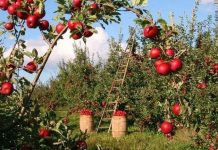Africa-Press – Tanzania. ZANZIBAR soil is suitable for production of almost all crops, the just concluded soil testing to guide cultivation of appropriate crops has concluded.
According to Agriculture, Irrigation, Natural Resources and Livestock Minister Shamata Shaame Khamis, there is no crop that is unsuitable for growing in the spice islands.
“The soil testing drive has been a great success; there is no crop whose growth has been rejected in Zanzibar,” Minister Shamata told the Daily News in an interview here yesterday, noting however that many farmers are shifting to money-minting horticultural sub-sector.
He said cloves and coconuts remain Zanzibar’s major commercial crops but decried an increasing rate of coconut fruit (dough) harvest, which jeopardises the future of coconuts in the isles. He challenged farmers to grow coconut to maturity for the crop sustainability.
The minister appreciated farmers who grow rice and cassava as both cash and food crops, pledging government support to ensure the agricultural sector thrives in the country.
He commended indigenous farmers in Unguja and Pemba islands for a great job they are doing, reiterating the government commitment to support agriculture to guarantee food security for the islanders.
The government had through the ministry of agriculture embarked on soil testing drive to collect relevant data to guide cultivation of appropriate crops at suitable areas, with each district allocated test kits for the exercise.
Minister Shamata said the ministry is working closely with Nungwi farmers to equip them with skills to prepare and use manure fertilisers for increased farm production.
He said the ministry has deployed extension officers to train farmers on organic farming as well as encouraging peasants to plant leguminous crops and practice crop rotation to boost soil fertility.
Food security and expansive irrigation farming were the ministry’s top priorities in this financial year, with the government committed to boost food reserve through procurement of 500 tonnes of rice; and purchase of eight tones of paddy seeds for multiplication and distribution to seed growers.
Zanzibar has 33,800 acres under rice irrigation farming in Unguja and Pemba while the country’s plan in the current fiscal year was to plant 1,000,000 clove, coconut, fruit and spice seedlings
For More News And Analysis About Tanzania Follow Africa-Press







